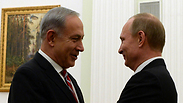
What Ukraine can learn from Israeli-Palestinian conflict
Op-ed: Borders are not sacred; only people and their right to self-determination are worth being viewed as such; it's as true in the settlements as it is in Kiev and Crimea.
And today, on the very eve of the centennial of the start of World War I, events in Ukraine are taking an ominous turn. This somber unfolding of events is not only due to the recklessness of Russian President Vladimir Putin, but also the incompetence of Western leaders.
The issue that should determine Western diplomatic moves is not whether Putin is a despicable autocrat (he was one long before this crisis), but deciding which cardinal mistakes made a century ago should be avoided in modern times.
Unfortunately, evidence suggests that the West is still playing its cards as haphazardly as the allies did a hundred years ago. US Secretary of State Kerry’s warning of the tremendous price Russia will pay for its "aggression" will boomerang on two counts: Firstly, portraying Russian support for Russian ethnic minorities in Ukraine as an act of aggression helps Putin’s propaganda machine to market him as a brave Russian patriot. Secondly, and more gravely, the Western blanket critique of Russia will foster inflexibility in the Ukrainian leaders, and, on the basis of unconditional US support, allow them to overreact in a way that does not serve the interests of any of the parties involved. Indeed, if Western leaders do not want a rerun of 1914, they should pause for a more sober analysis of the Ukrainian reality.
Ever since its independence in 1991, Ukraine has been on the cusp of joiing the club of failed nations. Despite its vast agricultural potential and enviable natural resources, Ukraine’s contemporary history has been marred by straggling economic performance and political paralysis. The root of this sorry state of affairs is the demographic split between Ukrainians in the West who look to the European Union and the western world, and the ethnic Russians in Eastern Ukraine (and Crimea) who look to Mother Russia.
Demographic realities
This split in Ukraine is as deep, if not deeper, than the one between the Czechs and Slovaks who won their independence in the early 1990s. There is no reason why ethnic Russians should not be encouraged to follow suit, thereby transforming Ukraine from a scene of political paralysis and revolutions into a viable nation-state.
The solution that best serves the interests of all parties in the conflict – namely Ukraine, Russia and the West – is for the ethnic Russian population in Ukraine to be given a chance to vote for either the status quo, autonomy within an independent Ukraine, or annexation by Russia. In order to secure support for such a plan from Ukraine’s leadership, the West should promise them speedy admission to the European Union and NATO. This would have the advantage of uniting Ukrainians who want to be Ukrainians behind a common goal and to greatly reduce the number of advocates for Russian annexation.
Although it might appear immoral to reward Russian aggression with a referendum on self-determination for ethnic Russians, let us not ignore the fact that Russia’s latest foray could well be the great opportunity to cut the Gordian knot that has choked Ukraine since its independence.
In this context, the experience of Israelis, Palestinians and American negotiators in addressing the Israeli-Arab conflict is invaluable. There is a great lesson in the fact that demographic realities in the West Bank must be taken into account in determining the final borders of Israel and Palestine:
Borders are not sacred; only people and their right to self-determination are worth being viewed as such. The former is as true in east Jerusalem and the settlement blocs as it is in Kiev and Crimea.
Let us pray that Secretary of State John Kerry will apply the lessons he should have learnt in Jerusalem and Ramallah to stop the conflict between Ukraine and Russia from escalating into military conflict and catastrophe.










